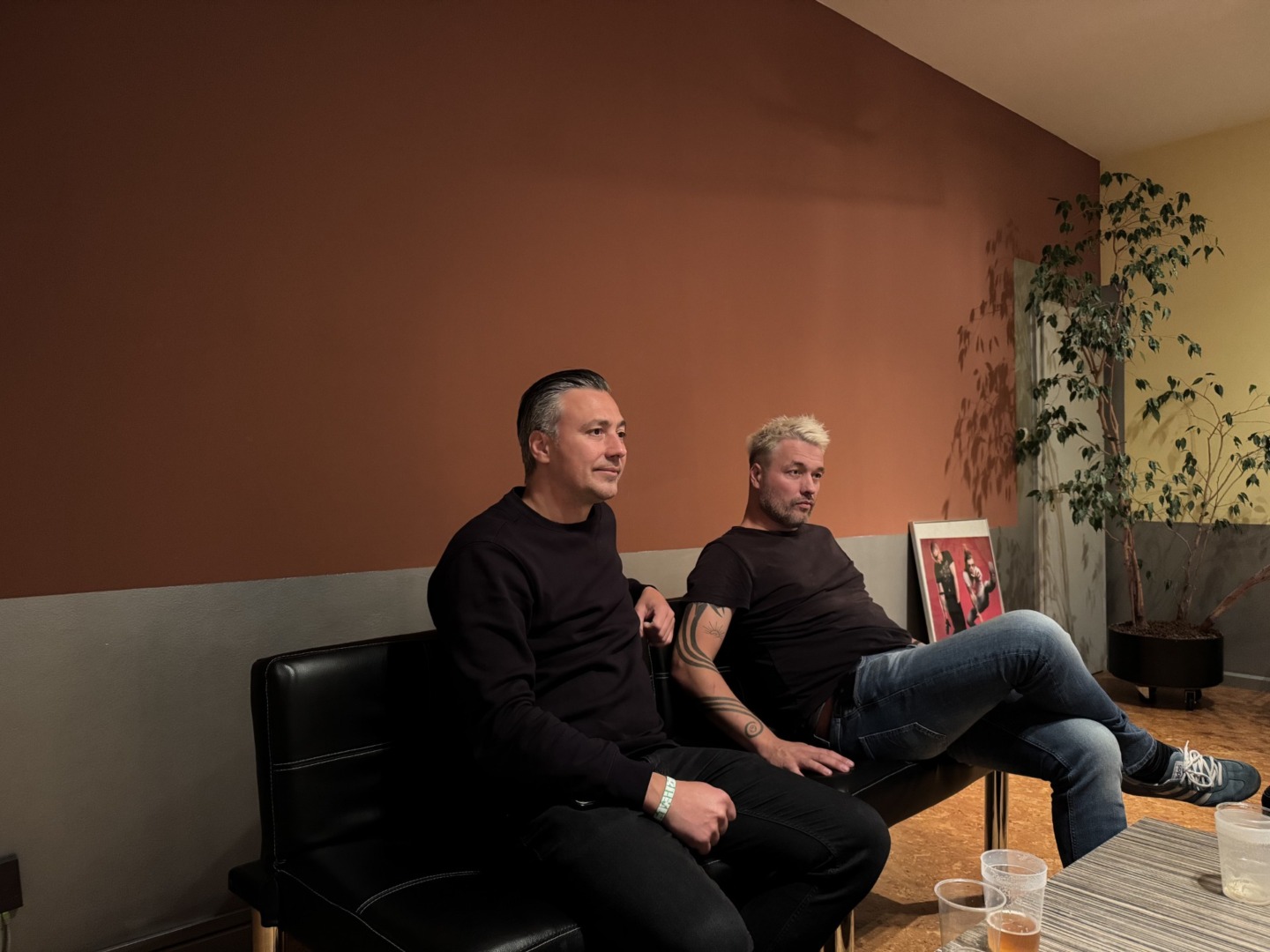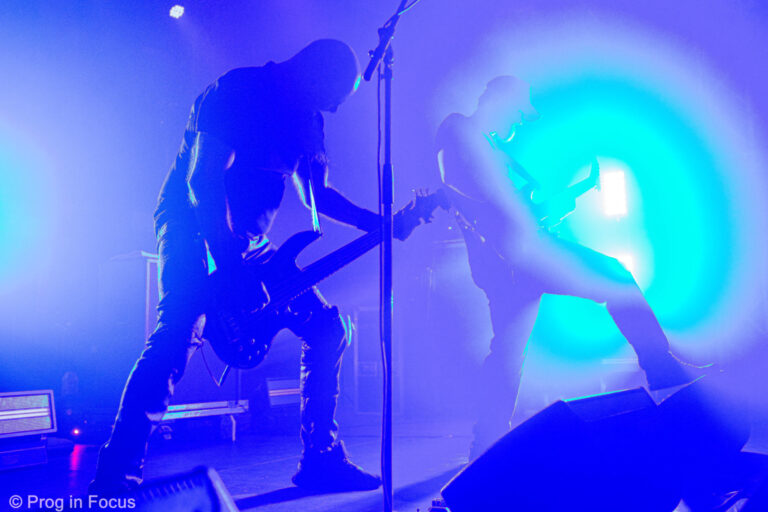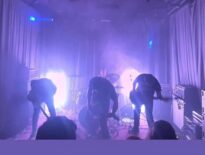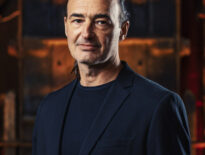Zweiter Tag beim Euroblast Festival 2024. Ganz spontan erklären sich Gitarrist Mircea Gabriel Eftemie und Sänger Michael Bøgballe von Mnemic bereit, sich den Fragen von Betreuer Gilles Iachelini zu stellen. Das Gespräch mit den Dänen ist im Folgenden wiedergegeben, wie es geführt wurde, auf Englisch.

Let’s start with a question about the past and the debut album “Mechanical Spin Phenomena“, which was released in 2003. This album is such a blast, especially considering the time of release and the level of originality. In what state were you as a band at that time? How could you come up with something like that?
Michael: We were in our early twenties. We didn’t had much gear or equipment at that time, but we had visions. We set up some rules for ourselves. Whenever we were in the rehearsal room we wanted to create new songs and work on tracks. Whenever we were creating something new and one guy of the band had this “This sounds like…”-moment, we threw it away. That was a very hard creating process. We took a lot of really good riffs and melodies and threw it away.
Mircea: Even though we actually liked it. Because it was too close to bands to we looked up to. This was the analytical mindset we had. Consciously we wanted to do something more original. Because we saw a lot of other bands at that time doing a lot of copying. I mean, we were extremely inspired by Meshuggah (or Fear Factory) and the way they were composing their music. Actually you couldn’t be not inspired by these bands. You can hear that in the music. But we tried not to lean on them too much.
Very well succeeded. You have these clean parts – and these harmonies (vocals, keyboards) are so far away from Meshuggah.
Well, those were strongly inspired by Strapping Young Lad and Fear Factory as well.
Interesting. We’ll get to SYL later. The debut album was released in September 2003 and the next album “The Audio Injected Soul” was released in October 2004. How on god’s earth did you manage to create a new full length album, while assumingly being involved in touring and promotion work for the debut album?
Michael: That was actually a very hard time. We slept very often in the rehearsal room. And we didn’t live far from the rehearsal room. Back then we all lived very close to each other. Actually we played a lot when being with each other. So we didn’t rehearse that much, but wrote new material instead. And we recorded the tracks right away. We tried that on the road as well. But that didn’t work out too well.
Mircea: I can’t remember that.
(all laughing)
Michael: We really had good intentions. But in the rehearsal room, we were really working hard. Even when we came back from a month long tour, we met the next day in the rehearsal room. Which would be completely insane now, but we actually did it back then.
Mircea: For instance ‘Liquid‘ (the opener of the debut album), we wrote the day before we entered the studio. Because we didn’t had enough songs to cover a full length album. We were completely stressed before the day of recording. I have no clue how we did it, but we have been under a lot of pressure. But the creative juice was just flowing. And then one day before, we nailed one of the best songs.
Michael: We did some writing the next day in the studio as well.
Mircea: We did?
(all laughing)
Sie sehen gerade einen Platzhalterinhalt von YouTube. Um auf den eigentlichen Inhalt zuzugreifen, klicken Sie auf die Schaltfläche unten. Bitte beachten Sie, dass dabei Daten an Drittanbieter weitergegeben werden.
I thought I could not attend the interview without being able to play at least one Mnemic song on guitar. So I actually tried ‘Liquid’, which has an interesting tuning. Basically the 6 string guitars are tuned as if they were 7-string guitars. With an extra half step down tune of the “G”. (B,E,A,D,F#, B). What I immediately noticed was the main (staccato) riff, which reminded me of the DEI phase of Meshuggah. But then I was asking myself what part of SYL did influence you? I thought a bit about the majestic choruses maybe?
Mircea: Right. It was more stuff from the “City” album (Example). That was the album that influenced us along with “D.E.I” from Meshuggah. And not just the music, but the concept of creating their music. This counts for both bands. I remember Meshuggah were talking about inspiration and they were mentioning movies, books and so on. It was a complete mix of sources of inspiration. And we took that framework and applied it to our own compositions. And I think that’s what made us making the music as of today.
So you mentioned the “City” album, the brutality?
Mircea: Not only that. Even in that “brutality” there is harmony. The way he is singing. That sounds so atmospheric and majestic. And that were the things we applied to our music. But a lot of stuff is happening in the studio. Especially when we start the layering of sounds. We usually did not have a 100% clear vision, but we had ideas where we wanted to go, but we could not know how the end result would sound like. So we started building layers such as vocals, keyboards, samples on top of each other. You could say we got inspired by Front Line Assembly for that. I remember we went to the movies and saw “The Matrix”. We took a lot of visual inspiration from that movie. Still, one of my favorite movies. But I remember when we went there, all of us, and we were completely stoned out of our minds, when we saw that movie.
(compassionate laughter)
And that mixture of things such as music and images. That’s how we thought about our music.
Lets go a bit further in your band history. In another interview I read that the record company put pressure on you (as a band) that your next album (the “Passenger” album) had to be “your ‘Master Of Puppets’ release”. What exactly did they mean?
Mircea: They most likely meant the level of success. But you cannot force the level of success of an album. Michael also has left the band before that album. And that’s when things went downwards too.
I think the “The Audio Injected Soul” (the release before “Passenger”) was already a huge step forward compared to the debut. Songwriting- but also production-wise. So why did they do that?
Mircea: Well, they wanted an even more successful album than the one before, but one key component of the band just left and we had to deal with that. That was the number one problem. And with the pressure to create a great phenomenal album which puts you on the world map, you can’t force that. It was like getting punched in the gut and loose an important band member. And that’s all of the sudden also part of the creation process. No idea, what would have happened when Michael would have stayed in the band.
So what we did in the two first albums was a natural outburst of creativity, when were very young.
Whenever they spotted a detail later, while hearing it, they immediately went back to the studio and showed the producers what they found and insisted on fixing it. Even when the producer told them to (polite version) stop it and leave, because a new band booked the studio already, they even insisted on fixing it and said “we are not done here!”
So, lets talk about “Passenger”. The sound of this album is so balanced, wide-ranged, powerful. Were you personally involved in producing this album?
Mircea: Not really. We were working with Cristian Wolbers from Fear Factory. But then it went back to Tue Madsen our original producer, who was already responsible for the first two releases. But we tried different stuff. For instance we used 6-strings guitars and low tuning on the first two release, while we were experimenting with 7-string guitars on that one. It was a thing of the time back then.
Michael: Even though I wasn’t around at that time, I knew what was going on. These guys are nerds about details. And that what was happening also on the first two albums. Nothing was left to coincidence. Everyone was so focused on any little detail of the product. Whenever they spotted a detail later, while hearing it, they immediately went back to the studio and showed the producers what they found and insisted on fixing it. Even when the producer told them to (polite version) stop it and leave, because a new band booked the studio already, they even insisted on fixing it and said “we are not done here!”.
Mircea: Yeah, it was always a very analytical process.
Michael: VERY, yeah. Almost to the point of being ridiculous. It was like we were coming in AFTER the process of the recording with a bunch of notes and we said “Can we go through this and that again” and the guys from the studio were like “You can’t be serious?”
And that is in some sort the DNA of the band. And its maybe also a bad thing, because we were too much thinking about things.
Mircea: But the end product shows these efforts.
Michael: And maybe nowadays we let go a bit more.
This directly leads to the fourth album “Sons of the System” where you (Mircea) said in an interview that you actually “let go” a bit more songwriting- and sound wise. Is that true?
Mircea: I think we really got a little bit confused on the fourth and fifth album. We got inspired by different things, but we kind of lost focus on the song writing process. People changed, people got older.
Coming from a personal interest on how songs are actually created in a band like Mnemic, I was wondering with all those engineers and production professionals around in the studio, who has actually the lead or who drives this process the most? Was it you, Mircea?
Mircea: No, it was a combination. The core of the band is the Drummer Brian (Brian Rasmussen) and the guitar player Rune (Rune Stigart). They were the ones I hooked up with when we started the band. That was a combination of living close to each other in the same city. But I was the young one and looked up to them. When we started playing together, I was the young one playing like shit, but obviously I was the one who was eager to see some progress. So I was kind of pushing the things and consolidating the ideas and contributions. I was then the one who called Michael, who was part of a reality show back then when he was young. And that is kind of how it all happened. And with Rune and Brian it forms the musical core of the band. The drummer actually was the one telling us “no, we are not using this or that riff because it sounds exactly like ‘Soul Burn‘”.
Somewhere around 2005/2006 you did a North America tour with Meshuggah (Picture). How was that like? How many people attended your shows back then?
Mircea: This was many years ago. Meshuggah weren’t that big at that time. Some days they were 800, some days there were 1500.
And how was it like to blast your music into that crowd?
Mircea: We weren’t thinking about it at all. We were just playing Heavy Metal. (all laughing)
Being on tour with Meshuggah was one of the craziest experiences. We watched them playing every night. I remember Brain (Rasmussen drums) speaking with Tomas (Haake, Meshuggah, drums) asking “How do you play this song on ‘Destroy Erase Improve’?” and then Tomas replied by playing air drums and hitting cymbals. And Brian didn’t understand a thing. And then Mårten (Hagström, Meshuggah, guitars) joins the conversation and said “Forget about Tomas, he isn’t very good in explaining things”. So, it was a phantastic time and we really enjoyed it. I remember one night watching them, looking to the people around me, and we all agree these guys are not from this planet. They are aliens. They are playing so good.
Check out this interview on YouTube to get more insights to their tour life and experiences in the past.
So, in 2013 the band disbanded. The band was formed in 1998, so this makes it 15 years of being in a band. Were you able to cut ties with this whole “band thing”?
Mircea: Sure, it was completely fine. (All laughing)
Seriously, I was 23, when we released our first album, we played a lot of shows and did a lot of other stuff, But at some point you get burned out, because we did it for over ten years. You grow older, you get responsibilities, you need to get an education.
Michael: But touring is also hard.
Mircea: Yeah, touring is also hard. It’s also about economy, financially. In other words, it never really became a successful business for us, where you have employees and a salary. Exactly like a company. The things changed over the years: We were losing focus, the market was shifting and so on. So doing it for so many years, I got burned out. Burned out on the music in general. So I completely stopped with music and went to a tech entrepreneurship.
And that was true for the whole band back then?
Mircea: Yeah. And Michael made a wise decision back then. He said he had to work on something to get a stable income and founded a family. He had different values. I fully respect that.
One final question: A few weeks prior to this interview, I was casually chatting about Mnemic with an old friend of mine and was randomly visiting your Wikipedia page and saw to my surprise that you guys reunited after 11 years! (Fun fact: The change on the Wikipedia page was done one day before my visit). So, who called the guys?
Michael: It was Mircea. He knows how to put everything into a plan. And we have people in this band, who definitely need a plan.
(all laughing)
Everybody needs a plan, but you (Mircea) are good at it.
Mircea: Thank you.
Michael: But also this came up by some festivals who called us asking for a reunion. (But he couldn’t reveal which one it was.)
Mircea: The biggest concern we had was, whether Brian could still play. But it turned out he had been rehearsing all the time. That’s his biggest passion after all: Playing drums.
And then lets face it, talk about the elephant in the room…
(everyone staring at me with big eyes)…
is there a new release in the pipeline?
Mircea: We are thinking “very hard” about it. 😉
Michael: The chemistry in the band is very good and we are having a good time.
Mircea: But one issue is time, while we all have families, kids and companies. We need more time. I mean, I would love to start composing and recording. But it all depends on the star-aligning and having the time for it.
Thanks guys for this interview. It’s been a pleasure.
Mircea/Michael: Thank you too. Lets get this thing up to 60k impressions.
(Editor: He kindly alludes to 60.000 page impressions per month of the website – when things are going well, we already have that Bro’, but thank you!)
Surftipps zu Mnemic
Facebook
Instagram
YouTube
Spotify
Soundcloud
Wikipedia

Zum Bericht über die Euroblast-Ausgabe, auf der das Interview geführt wurde.




